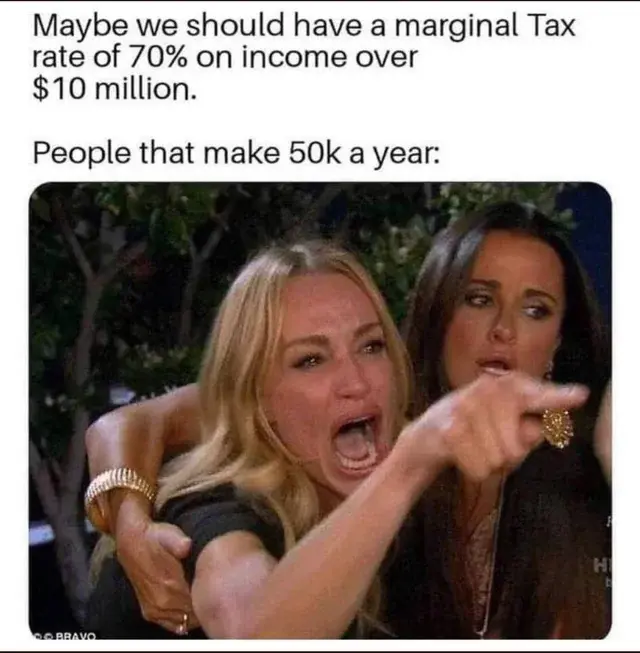this post was submitted on 15 Jan 2024
1809 points (97.6% liked)
Political Memes
5613 readers
1067 users here now
Welcome to politcal memes!
These are our rules:
Be civil
Jokes are okay, but don’t intentionally harass or disturb any member of our community. Sexism, racism and bigotry are not allowed. Good faith argumentation only. No posts discouraging people to vote or shaming people for voting.
No misinformation
Don’t post any intentional misinformation. When asked by mods, provide sources for any claims you make.
Posts should be memes
Random pictures do not qualify as memes. Relevance to politics is required.
No bots, spam or self-promotion
Follow instance rules, ask for your bot to be allowed on this community.
founded 2 years ago
MODERATORS
you are viewing a single comment's thread
view the rest of the comments
view the rest of the comments

This actually happened with bitcoin a while back due to its under-regulated nature. A few people lost their pants when the value of bitcoin skyrocketed on one day in december and then plummetted in early January, and the IRS came knocking for those unrealized gains.
Largely, We don't tax unrealized gains because unrealized gains is value that hypothetically can disappear as quickly as it shows up. It's like taxing someone after every hand of blackjack - you can end up broke AND owing 10x your starting money in capital gains taxes. In theory, a stock portfolio can go from way-up to way-down in 24 hours. Ditto with real-estate if there manifests an uncovered loss event or the title gets fucked, or environmental regulation changes in a way that affects the property, etc.
...I'm not saying there's not a way to do it right. It just needs to be done very VERY carefully so as not to bankrupt people. It would likely have to be more complicated than most tax law is now.
I know very little about stocks, unrealized gains, and taxes in general, but wouldn't it be simple to tax the incremental gain or loss of capital assets?
"What? Tax the gain of a gain? What's that?"
I believe that would be called a derivative in math speak. Basically, if there's a "spike" the up-spike would have a positive tax. The "down-spike" would have a negative tax. What you end up owing is the change from before to after.
How would this be done?
That's for someone smarter than me to figure out, but I would think there would be a way to plot the value over time, plot the derivative, then the value at the end of the year is what you owe. If it's negative then you get some back, if it's positive you owe.
That's what happeend with bitcoins. High volitility investments are quite literally the problem with taxing unrealized gains. If something is worth $1 for 364 days, an $1B for 1 day, how much do you tax? If that day was 12/31 and it's cryptocurrency, you tax that $1B, even if it's back down to $1 and the person's total net worth is in the single digits. YES, that's an exaggeration of what's really happened, but only to exemplify. This is also a real issue with forex and non-blue-chip stocks. To a lesser extent, it's true for real estate, especially high-risk real estate investments. There's a lot of things like possibly-landlocked properties for sale where the buyer is assuming fairly heavy risk. If things go well, they got a steal. If things go badly, they have a worthless deed.
Despite the general trends of property, the value of an actual piece of property (or any investments) any time before the moment it's sold is an estimate at best. That bitcoin example above was never worth $1B if the owner was not actionably able to liquidate it for that price, regardless of the estimated worth.
I HATE to defend Bezos on anything, but attempting to tax the value of his Amazon stock is problematic because he would 100% get MUCH less than the value of his stock if he sold it. Since he's ultra-rich, I'm ok with taxing him as if he made $1B if he could only get full price if he liquidates the first $5M of $1B in stock, but that same effect will happen to people who make a lot less than him. Now, he deserves to be paying more than he does, a whole hell of a lot more, but taxes are not just anti-rich corrupt, they're COMPLICATED to get money from the rich without having unexpected outcomes for everyone.
Not sure who you're quoting on that. Taxing the "wealth acceleration" seems bizarre and pro-ultra-rich to me. That actually WOULD punish people who make their first million while rewarding someone who makes $1B/yr consistently. I do have enough understanding of calculus to follow the ball on that one, and I don't think it lands how you think it would.